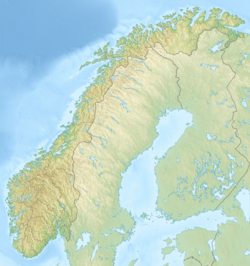Earth:Sundvollen Formation
| Sundvollen Formation Stratigraphic range: Gorstian-Ludfordian (Rootsiküla) ~426.2–423 Ma | |
|---|---|
| Type | Formation |
| Unit of | Ringerike Group |
| Underlies | Stubdal Formation |
| Overlies | Steinsfjorden Formation |
| Lithology | |
| Primary | Sandstone |
| Other | Siltstone, shale |
| Location | |
| Coordinates | [ ⚑ ] : 59°54′N 10°48′E / 59.9°N 10.8°E |
| Paleocoordinates | [ ⚑ ] 16°54′S 7°18′W / 16.9°S 7.3°W |
| Region | Oslo Region, Ringerike |
| Country | Norway |
| Extent | North and eastern Steinsfjorden |
The Sundvollen Formation is a geologic formation cropping out along the northern and eastern shores of Steinsfjorden, Oslo Region, Norway. It preserves fossils dating back to the Gorstian to Ludfordian stages (Rootsiküla in the regional stratigraphy) of the Late Silurian period.[1]
Description
The formation belongs to the Ringerike Group,[2] overlies the Steinsfjorden Formation and is overlain by the Stubdal Formation. The fish assemblage originates from a horizon with fine-grained, dark greyish-green sandstone from the lowermost part of the formation.[3]
The formation comprises dark-grey siltstones associated with red sandstones and siltstones, with ripple marks, cross-laminations, and crack diapirs, and pseudo-nodules, carbonate concretions. The sequence is fining upwards in cyclothems. Tracks attributed to eurypterids have been found in the red siltstone. Turner (1974) interprets the Sundvollen Formation as representing meandering, braided streams on an alluvial, coastal plain, very close to sea level because of the minor marine incursions found). Boucot and Janis (1983) interpreted the environment to be possibly brackish-estuarine.[4]
Fossil content
The following fossils have been reported from the formation:[1]
Fish
Eurypterids
Invertebrates
- Crustaceans
- Chasmataspidids
- Xiphosura
- Xiphosurida indet.[5]
- Bunodes sp.[8]
Flora
- Plantae indet.[5]
- Dictyocaris slimoni.[11]
Correlations
The Sundvollen Formation correlates with the lower part of the Store Arøya Formation.[3]
See also
References
- ↑ 1.0 1.1 Sundvollen Formation at Fossilworks.org
- ↑ Bremer et al., 2019, p.129
- ↑ 3.0 3.1 Bremer et al., 2019, p.132
- ↑ Eurypterid-Associated Biota of the Sundvollen Form. at Rudstangen at Fossilworks.org
- ↑ 5.00 5.01 5.02 5.03 5.04 5.05 5.06 5.07 5.08 5.09 5.10 5.11 5.12 5.13 Plotnick, 1999
- ↑ Bremer et al., 2019, p.142
- ↑ 7.0 7.1 Bremer et al., 2019, p.144
- ↑ 8.0 8.1 8.2 8.3 Baarli et al., 1999
- ↑ 9.0 9.1 9.2 Bremer et al., 2019, p.145
- ↑ Bremer et al., 2019, p.146
- ↑ Brookfield, M. E. (2024). "The Life and Death of Jamoytius kerwoodi White; A Silurian Jawless Nektonic Herbivore?". Fossil Studies 2 (2): 77–91. doi:10.3390/fossils2020003.
Bibliography
- Bremer, Oskar; Turner, Susan; Märss, Tiiu; Blom, Henning (2019), "Silurian vertebrate remains from the Oslo Region, Norway, and their implications for regional biostratigraphy", Norwegian Journal of Geology 99: 129–155, doi:10.17850/njg99-1-07, https://njg.geologi.no/vol-91-100/details/1/2206-2206 50px Material was copied from this source, which is available under a Creative Commons Attribution 4.0 International License
- Baarli, B. G.; Keilen, H. B.; Johnson, M. E. (1999), Silurian communities of the Oslo Region, Norway, in A. J. Boucot, J. D. Lawson (eds.), Paleocommunities - a case study from the Silurian and Lower Devonian, pp. 327–349
- Plotnick, R. E (1999), Habitat of Llandoverian-Lochkovian eurypterids, in A. J. Boucot, J. D. Lawson (eds.), Paleocommunities - a case study from the Silurian and Lower Devonian, pp. 106–136
 |

